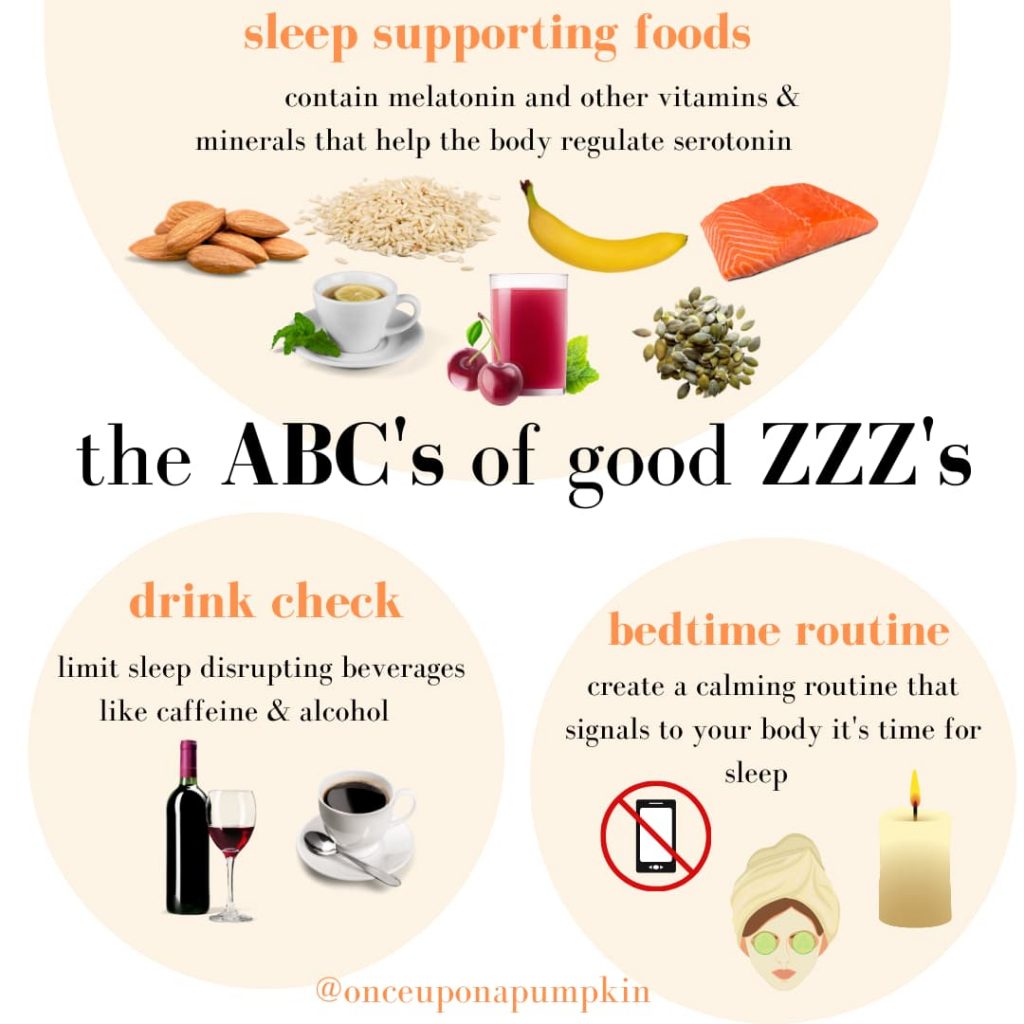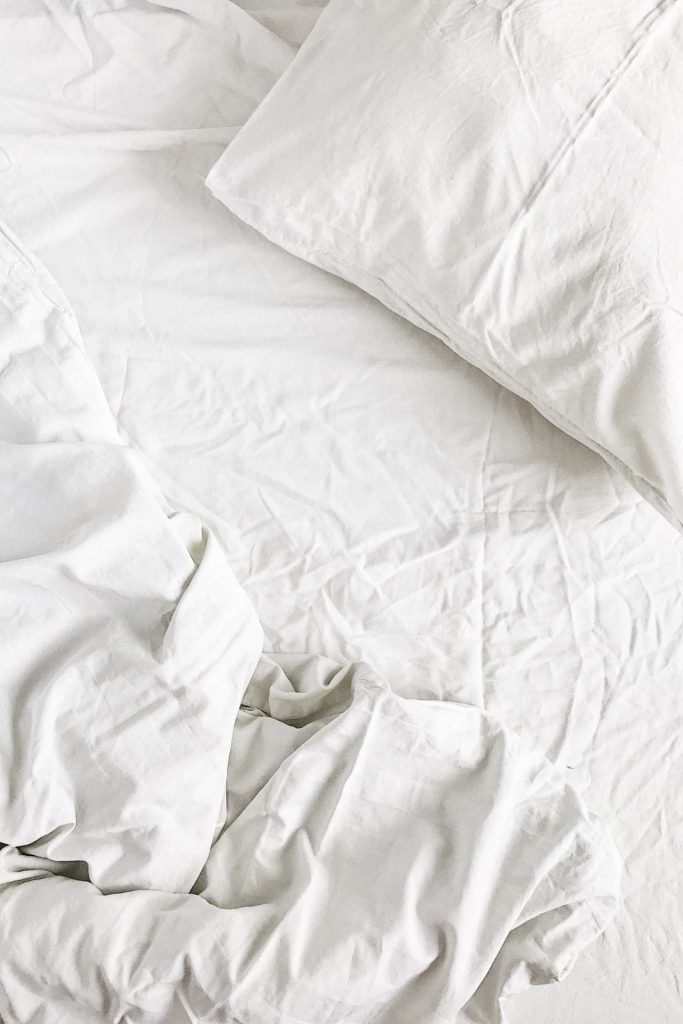Learn how to improve sleep quality by incorporating certain foods into your diet and optimizing your sleep hygiene. Understand what hormones regulate sleep and why high quality sleep is so important for our overall health.
Between stress, screen time and the emotions that come with adjusting to our new normal in 2021, good sleep is hard to come by for many of us these days.
If you’re tired of (literally!) struggling to get a good nights sleep, find out how your diet and environment can play a part in helping improve sleep quality.
sleep and health — why it’s important
Good sleep is the key to so many positive health benefits. One simple benefit that just might be the biggest is feeling good and having energy for daily life — something we can never take for granted. That’s just one of many reasons to get serious about your sleep routine for life!
Sleep deprivation and decision making
Sleep is one of your biggest tools when it comes to making healthy choices throughout the day too. Consider the cycle of waking up not well rested, not feeling like you have enough energy to exercise or even go for a walk, and not wanting to make healthy nutrition choices because your body is craving simple carbohydrates for energy since it’s sleep deprived.
In this case not getting good rest is hindering you from making other positive health choices.
sleep and recovery
Our bodies need that rest to perform so many different reparative and restorative processes that help us feel our best the next day.
Let’s chat about what foods help promote sleep and how our environment and bedtime routine can be optimized for good sleep too.
gut health and sleep
We continue to learn so much about gut health and how important the health of our gut is to so many things like immunity, mood, and you guessed it, sleep too.
A recent study indicated that poor sleep can negatively affect your gut microbiome, which can, in turn, lead to additional health issues.
Maybe you’ve heard the term “gut-brain connection” before, which essentially refers to the communication “highway” between what’s going on in your gut and what’s going on in your brain.
Poor sleep quality impacts our brain, which can have a negative impact on our gut too — and vice versa.
Interested in learning more about gut health and how it impacts our mood? Check out this post on 7 mood boosting foods to add to your diet.
Speaking of food, let’s chat about what foods help to improve sleep quality and how our environment and sleep hygiene can be optimized for good sleep too.

Sleep Hormones
First, I think it’s important to understand what has to happen in our body in order for sleep to occur. Let’s start by looking at the sleep hormones that help fall asleep and stay asleep.
Melatonin
Melatonin is a hormone produced by our body when it’s dark that help to regulate our internal clock (aka circadian rhythm) and signals to the body to prepare for sleep. Being exposed to light at night can block melatonin production.
Serotonin
Serotonin is a hormone that stabilizes our mood, feelings of well-being, and happiness. This hormone impacts our entire body!
It enables brain cells and other nervous system cells to communicate with each other and helps with sleep, eating and digestion.
Foods that help you sleep
Nutrition and sleep? They’re connected! Check out this list of 10 foods that help you sleep. Each of these foods contains melatonin and or other vitamins and minerals that send signals to the brain that it’s time to sleep and help improve sleep quality.
- Fatty fish – Fatty fish like salmon is a good source of omega-3 fatty acids (the healthy fat we want more of in our diets) and vitamin D. Both omega-3’s and vitamin D have been shown to increase the production of serotonin, another impressive benefit of including seafood in your diet on a regular basis.
- Turkey – Turkey is a good source of tryptophan (hello post Thanksgiving nap!). Tryptophan is an essential amino acid (meaning we have to get it from our diet) that helps with the production of melatonin and serotonin.
- Rice – It’s been suggested that eating foods with a high glycemic index, such as white rice, at least 1 hour before bed may help improve sleep quality. One study compared the sleep habits of 1,848 people based on their intake of rice, bread, or noodles. Higher rice intake was associated with better sleep than bread or noodles, including longer sleep duration.
- Oats – Oats are another source of melatonin. That along with the fact that they are higher in carbs has been reported making people sleepier.
- Dairy – Dairy products, such as milk, cottage cheese, and plain yogurt, are known sources of tryptophan. Milk has been shown to improve sleep in older adults, especially when paired with light exercise.
- Nuts – Nuts like walnuts and almonds are one of the best sources of melatonin. Additionally, walnuts contain healthy omega-3 fatty acids that help with serotonin production and almonds are high in magnesium, which helps to improve sleep quality.
- Chamomile tea – Caffeine free tea is a great nighttime tea to help you relax and ready for bed. Specifically chamomile tea contain specific antioxidants that bind to receptors in the brain that may promote sleepiness and reduce insomnia. Passionflower tea has also been studied for it’s impact on sleep and there is evidence that in addition to promoting relaxation, it can help inhibit other brain chemicals that induce stress.
- Pumpkin seeds – Pumpkin seeds are a great source of magnesium, a mineral that helps to promote calm and relax our muscles and nervous system. See my suggestion below for making a homemade trail mix with them!
- Tart cherry juice – Tart cherry juice is a good source of melatonin and studies have shown it promotes sleepiness, and can help prevent insomnia.
- Bananas – Banana peels contain tryptophan and the fruit itself is a modest source of magnesium. Both of these properties may help you get a good night’s sleep.
I think it’s also important to note that eating enough food during the day is a key to falling and staying asleep. Not enough calories throughout the day can majorly disrupt our ability to fall asleep and stay asleep.
When I wake up hungry I grab a spoonful of peanut butter, or coconut oil or half a banana to help me get back to sleep.
sleep supporting snacks
Whip up one of these snacks before bed to give your body a boost of the the nutrition it needs for good sleep!
- banana + 1 tbsp of peanut butter
- homemade trail mix made of pumpkin seeds, walnuts, almonds and dark chocolate chips + a cup of chamomile tea
- 1 serving of unsweetened oatmeal with banana slices
caffeine and sleep
One easy way to ensure you’re able to fall asleep at night is to cut off your caffeine consumption in the afternoon.
Caffeine (and alcohol) are stimulants meaning they do they opposite of what we want to be happening in our bodies when we’re trying to prepare for sleep.
Caffeine is typically out of your system in 5 hours, but that could be varies from person to person and can be longer for you. If you’re sensitive cut it off a little earlier than you might think!
Alcohol AND SLEEP
Nightcaps and red wine are often label as sleep promoting beverages but truly, they’re not. In most cases they are major sleep disruptors hindering you from getting a good nights sleep. Consider doing a dry month to see how your sleep changes when

SLEEP HYGIENE TIPS FOR A BETTER NIGHTTIME ROUTINE
- ditch electronics at least an hour before bed. I know you’ve heard this one a million times but it’s true! Stop scrolling and start winding down your mind for bed by not looking at blue light. We literally need to send signals to our body and brain that it’s time for bed and that darn blue light really disrupts those ( I won’t tell you what time it is as I write this!). What also helps me it plugging my phone in on the other side of my bedroom and not right next to me on my nightstand.
- set the mood. Light a candle, turn down the lights, do your nighttime skincare routine, and put your pajamas to help give your mind and body another signal that sleep is happening soon.
- indulge in a little self-care. Reading, journaling, putting a mask on your face, sipping tea, and listening to music or doing a meditation are all great ways not only enhance your life on a variety of levels, but also to wind down and feel good doing it.
- consider a signature scent. It’s been scientifically proven that scents are strongly tied to our emotions and memories. Use that connection to your advantage by burning a candle or spraying a room spray with calming scents that signal sleepy relaxation to the brain. Sleep promoting scents include lavender, sage, bergamot and chamomile.
- get into bed when you’re actually ready for sleep. Make sure your body knows that when you lay in bed it means sleep by only getting into bed when you’re ready to fall asleep. I know for some people reading in bed is a good sleep segue, but if that’s part of your routine and your not able to fall asleep, consider only laying down when it’s time for sleep!
other sleep boosters to improve sleep quality
If you feel like you’re doing all of the right things and still not getting enough restful sleep, it may be time to consider something to help improve you sleep quality.
As with any supplements, I highly recommend doing research before taking anything and if it seems too good to be true, it probably is.
These are a couple of products that help me and that I trust not only from an efficacy standpoint but also because of my own personal experience using them!
CBD for sleep
Researchers discovered that the endocannabinoid system plays a role in maintaining certain body functions, such as mood, appetite, sleep, and regulating circadian rhythms. CBD is a cannabinoid that attach to our cells in that system and interacts with receptors that promote sleep. CBD may also decrease anxiety and pain, which can both interfere with restful sleep.
I take and recommend Equilibria Women. All of their products are great! Use code “PUMPKIN” for 15% off of your first order.
Magnesium for sleep
Magnesium is kind of a big deal. Every cell and organ need it to function properly. It contributes to bone health, as well as proper brain, heart and muscle function.
On a chemical level, magnesium helps to activate the parasympathetic nervous system, the system responsible for getting you calm and relaxed. This is why it’s often referred to as the “calm mineral”.
In addition magnesium also regulates melatonin, which we know is a sleep hormone that needs to get switched on for our body’s natural sleep wake cycle to work properly. Magnesium binds to gamma-aminobutyric acid (GABA) receptors, and GABA is the neurotransmitter responsible for quieting down nerve activity.
I’ve recently started incorporating this magnesium supplement from mindbodygreen into my nighttime routine and have been loving it so far. No groggy feeling when I wake up and I feel good knowing I’m getting extra magnesium needed for all of the things it does in m body. Use code “PUMPKIN10” off of your first order. My code is valid on any of the mindbodygreen supplements!
Enjoyed reading about this topic? Let me know if this information is helpful in the comments! And if you have another nutrition topic that you’d like more info on, let me know! I’m always looking to explore other nutrition topics that help you have more food confidence, love your body more and just feel good on a daily basis!
XOXO
Maggie

